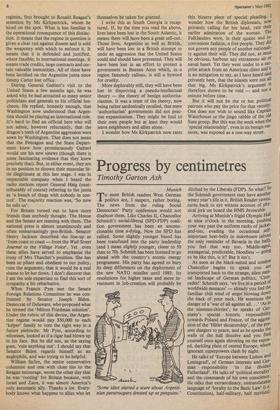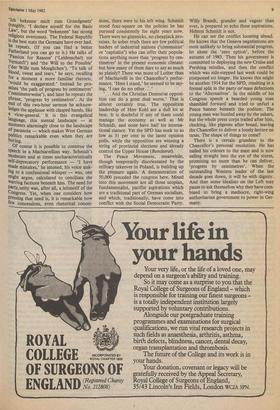Progress by centimetres
Timothy Garton Ash
Munich To most British readers West German politics are, I suspect, rather boring. The news from the ruling Social Democrats' Party conference would not disabuse them. Like Charles II, Chancellor Schmidt's social-liberal (SPD-FDP) coali- tion government has been an uncons- cionable time a-dying. Now the SPD has rallied. Some slightly younger blood has been transfused into the party leadership (and I mean slightly younger, closer to 50 than to 70). Schmidt has been licensed to go ahead with the country's atomic energy programme. His party has agreed to bury its deep differences on the deployment of the new NATO missiles until 1983. Its resolutions for higher taxes and more in- vestment in job-creation will probably be `Some idiot started a scare about Argenti- nian paratroopers dressed up as penguins.' ditched by the Liberals (FDP). So what? So the Schmidt government may have another weary year's life in it. British Reader yawns, turns back to eye witness account of PhY- sical jerk on board the HMS Invincible. Arriving at Munich's frigid Olympic Hall at nine o'clock in the morning, pushing your way past the uniform ranks of jacket- and-ties, evading the occasional self- important beer-belly in lederhosen (about the only reminder of Bavaria in the hall), you feel that way too. Middle-aged, managerial, predictable, bloodless — going to be like this, is it? But it isn't. As soon as the black-suited and sombre Chancellor begins to speak you are transported back to the strange, alien men- tal landscape of German politics. 'Com- rades!' Schmidt says, 'we live in a period of worldwide menaces' — already you feel the familiar chill wind of angst blowing down the back of your neck. He mentions the danger of a 'war of all against all.. "As in the nineteen-thirties', he speaks of Ger- many's special historic responsibility towards Poland and France, of the aggres- sion of the 'Hitler dictatorship', of the pre' sent dangers to peace, and as he speaks the walls of the hall dissolve and you find yourself once again shivering on the expos- ed, darkling plain of central Europe, where ignorant superpowers clash by night. He talks of 'Europe between Lisbon and Leningrad', of German interests and Ger- man responsibility 'in the divided, Fatherland'. He talks of 'political morality' and the commands of his own conscience. He talks that extraordinary, untranslatable language of 'loyalty to the Basic Law' (i.e. Constitution), half-military, half mystical: `Ich bekenne mich zum Grundgesetz' (roughly, 'I declare myself for the Basic Law', but the word 'bekennen' has strong religious overtones). The Federal Republic is the best state the Germans have ever had, he repeats. (If you can find a better Fatherland you can go to it.) He talks of Passion for Reason' (`Leidenschaft zur Vernunft') and 'the Will to the Possible' ('der Wille zum Moeglichen'). `To talk of blood, sweat and tears,' he says, recalling for a moment a more familiar rhetoric, would be exaggerated.' Instead he pro- mises 'the path of progress by centimetres' ( zentimeterweise), and later he repeats the phrase, 'progress by centimetres' . At the end of this two-hour sermon he acknow- ledges the applause with clasped hands, like a vicar-general. It is this evangelical language, this mental landscape — at moments alarmingly close to the landscape of Paranoia — which makes West German Politics remarkable even when they are boring.
Of course it is possible to construe the speech in a Machiavellian way. Schmidt's Moderate and at times uncharacteristically self-deprecatory performance — 'I have Made mistakes,' he intoned, his voice sink- ing to a confessional whisper — was, one might argue, calculated to conciliate the warring factions beneath him. The need for PartYomity was, after all, a leitmotif of the Congress. Yet, when one considers how Pressing that need is, it is remarkable how few concessions, even rhetorical conces-
sions, there were to his left wing. Schmidt stood four-square on the policies he has pursued consistently for eight years now. There were no gimmicks, no cheapjack pro- mises. In sober truth there are few political leaders of industrial nations ('communist' or 'capitalist') who can offer their popula- tions anything more than 'progress by cen- timetres' in the present economic climate: but how many of them dare to say as much so plainly? There was more of Luther than of Machiavelli in the Chancellor's perfor- mance. 'Here I stand,' he seemed to be say- ing, '1 can do no other. :.'
. And the Christian Democrat opposi- tion can do a great deal worse.' That is almost certainly true. The opposition leadership of Herr Kohl are a dull lot at best. It is doubtful if any of them could manage the economy as well as Mr Schmidt, and none have half his interna- tional stature. Yet the SPD has sunk to as low as 31 per cent in the latest opinion polls, while the opposition are winning a string of provincial elections and already control the Upper House (Bundesrat).
The Peace Movement, meanwhile, though temporarily disorientated by the military takeover in Poland, is building up the pressure again. A demonstration of 50,000 preceded the congress here. Mixed into this movement are all those utopian, fundamentalist, pacifist aspirations which are a traditional part of German socialism, and which, traditionally, have come into conflict with the Social Democratic Party. Willy Brandt, grander and vaguer than ever, is prepared to echo these aspirations. Helmut Schmidt is not.
He can see the conflict looming ahead. He knows that the Geneva negotiations are most unlikely to bring substantial progress, let alone the 'zero option', before the autumn of 1983. Then his government is committed to deploying the new Cruise and Pershing missiles, and then the conflict which was side-stepped last week could be postponed no longer. He knows this might be another 1914 for the SPD, resulting in a formal split in the party or mass defections to the 'Alternatives'. In the middle of his Congress speech a bearded young man shambled forward and tried to unfurl a Peace banner beneath the podium. The young man was hustled away by the ushers, but the whole press corps trailed after him, clucking, like pigeons after bread, leaving the Chancellor to deliver a lonely lecture on taxes. The shape of things to come?
There is a certain grandeur in the Chancellor's personal resolution. He has nailed his colours to the mast and is now sailing straight into the eye of the storm, promising no more than he can deliver, `progress by centimetres'. When the outstanding Western leader of the last decade goes down, it will be with dignity. And then some idealists on the Left may pause to ask themselves why they have com- bined to bring a mediocre, right-wing authoritarian government to power in Ger- many.







































 Previous page
Previous page